To boost protein absorption as an aging martial artist, consume 1.2-2.0g protein per kg bodyweight, spread throughout the day in 20g portions. Add digestive-enhancing foods like kiwi, pineapple and fermented products to your meals. Time your intake with training—consume protein within 30-60 minutes post-workout when your body is most receptive. Consider quality protein supplements with leucine, and pair proteins with acidic foods for better digestion. These strategies will help you maintain strength despite age-related challenges.
The Protein Challenge: Why Aging Martial Artists Need More
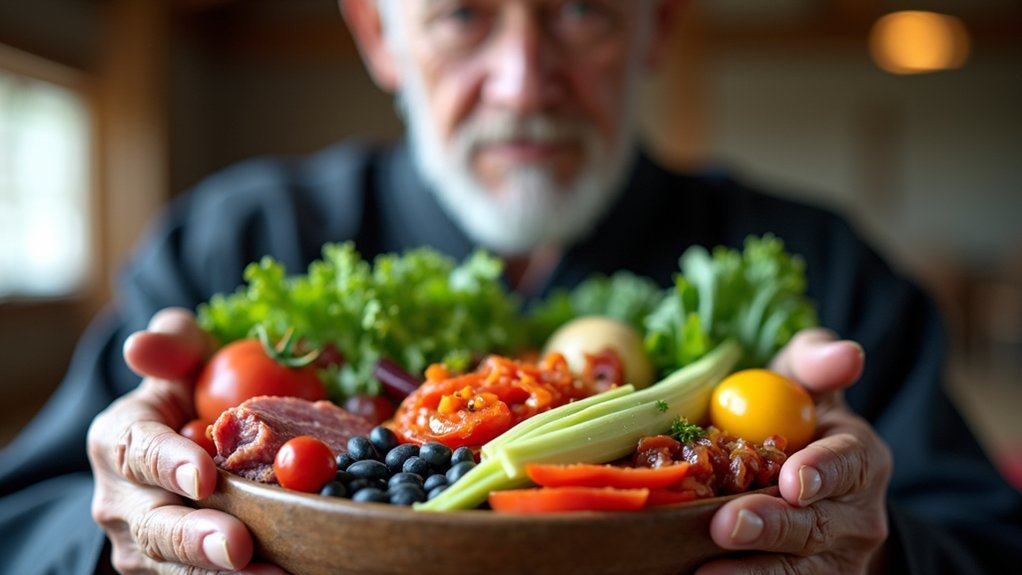
As you enter your senior years on the martial arts journey, your body’s protein needs shift greatly. Research shows you now require considerably more protein per kilogram of body weight than your younger counterparts—between 1.2 and 2.0 grams daily versus the standard 0.8 grams.
Senior martial artists need significantly more protein—1.2-2.0g per kg body weight versus the standard 0.8g for optimal performance.
This increased requirement stems from age-related sarcopenia (muscle loss) and your body’s decreased efficiency in protein synthesis.
Your martial arts training compounds this need, as physical activity demands additional protein for muscle repair and recovery. Incorporating lean proteins into your diet supports optimal training adaptation while accommodating your body’s changing nutritional needs.
Without adequate protein intake, you’ll likely experience slower recovery between training sessions, decreased strength, and diminished performance.
The challenge becomes not just consuming more protein, but ensuring your body effectively absorbs what you eat through proper hydration, nutrient timing, and dietary variety.
Age-Related Changes in Protein Metabolism and Muscle Function
Your body undergoes profound metabolic shifts as you age that directly impact your martial arts performance. As you enter your later years, your muscles develop “anabolic resistance,” requiring higher protein doses to achieve the same muscle-building response that came easily in your youth.
- Your muscle protein synthesis machinery remains functional but becomes less responsive to the anabolic signals from protein intake and training.
- Your muscles experience changes in myosin heavy chain composition, affecting contractile function and contributing to decreased power generation.
- Your body’s hormonal environment shifts, with declining IGF-1 levels that further dampen protein synthesis signals.
This anabolic resistance is particularly evident when consuming smaller, meal-like amounts of protein that would have been sufficient in your younger years.
While these changes are significant, they’re not insurmountable. Your muscles retain their adaptability even in advanced age when properly stimulated through strategic exercise and nutrition timing.
Essential Dietary Strategies to Enhance Protein Absorption
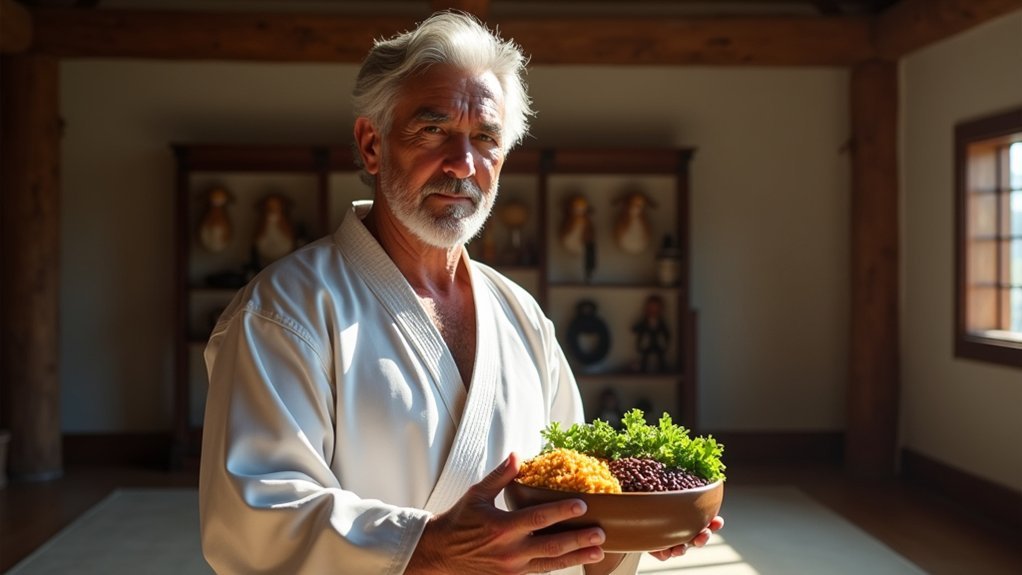
While training helps maintain muscle mass, optimizing protein absorption becomes crucial for aging martial artists facing metabolic challenges. To maximize benefits, spread your protein intake evenly throughout the day in 20g portions rather than consuming large amounts in a single meal. The absorption mechanism relies on specialized enterocytes that transport amino acids into the bloodstream for use throughout the body.
| Strategy | Implementation | Benefit |
|---|---|---|
| Enhance Enzyme Activity | Consume kiwi, pineapple, papaya with protein meals | Improves breakdown of protein into absorbable amino acids |
| Support Gut Health | Include yogurt, kimchi, kefir regularly | Enhances absorption of peptides and amino acids |
| Optimize Meal Composition | Pair proteins with acidic foods, limit fats | Creates ideal stomach environment for digestion |
Choose high-quality complete proteins like eggs, lean meats, and dairy. If you’re plant-based, combine complementary protein sources to guarantee you’re getting all essential amino acids.
Maximizing Post-Training Nutrition for Recovery
Following intense training sessions, aging martial artists need strategic nutritional timing to optimize recovery. Your body requires protein and carbohydrates within.30-60 minutes after training, ideally in a 1:3 or 1:4 ratio for effective glycogen replenishment and muscle repair. The right balance of macronutrients supports both immediate recovery needs and long-term training goals.
- Choose easily digestible protein sources like Greek yogurt, lean meats, or a protein shake combined with fruit to jumpstart recovery while delivering essential nutrients.
- Don’t overlook hydration—replace fluids equal to your body weight lost during training and include electrolytes to replenish minerals.
- Consider budget-friendly options such as quinoa with vegetables, beans with rice, or hardboiled eggs with fruit that deliver complete nutrition without breaking the bank.
Supplement Support: What Actually Works for Older Athletes
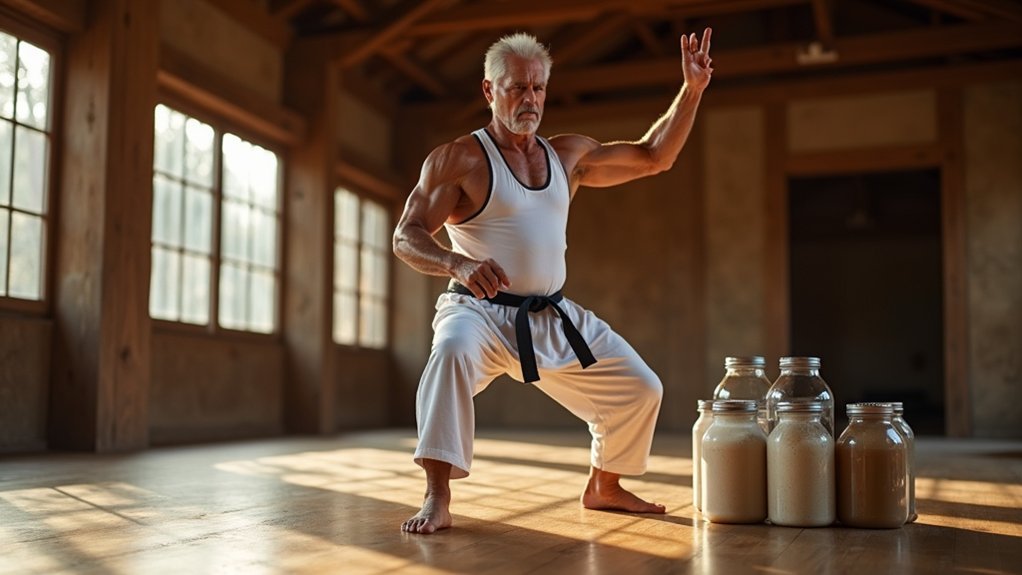
Many aging martial artists face physiological changes that greatly impact protein utilization and muscle maintenance. Your body develops anabolic resistance, requiring higher protein intake to maintain muscle function.
Whey protein supplements stand out as the most effective option, providing all essential amino acids and leucine critical for muscle synthesis. You’ll need approximately 1.2 g/kg of protein daily—about 50% above standard recommendations.
Consider taking 30-40g of protein post-training, as your aging body requires larger doses than younger athletes. Without adequate protein consumption, adults over 80 have a particularly high risk of experiencing sarcopenia challenges that can compromise martial arts performance.
For plant-based practitioners, you’ll need higher doses or protein combinations to match animal-derived benefits. Supplement timing matters too—whey works best post-workout while slower-digesting casein benefits overnight recovery.
Adding creatine and vitamin D can further enhance muscle function and protein metabolism.
Combining Exercise and Nutrition for Optimal Performance
Your workout effectiveness hinges on what you eat both before and after training sessions.
You’ll maximize protein absorption and muscle repair by consuming a combination of protein and carbohydrates within the critical 30-minute window surrounding your martial arts practice.
This strategic nutrient timing creates a synergistic effect where your exercise enhances nutrient utilization while proper fueling simultaneously amplifies your workout benefits. For high-intensity martial arts sessions lasting over 30 minutes, consider consuming rapidly absorbed carbohydrates to maintain optimal energy levels and performance.
Pre-Workout Fuel Strategies
While martial arts demands both mental focus and physical prowess, what you eat before training greatly impacts your performance. As an aging martial artist, your pre-workout nutrition becomes even more essential for maintaining energy and supporting protein absorption.
To optimize your pre-workout fuel strategy:
- Time your meals carefully – Consume a balanced snack 30-60 minutes before training, ensuring it contains both simple carbs for immediate energy and protein for muscle support. Selecting a snack like banana with nut butter provides the ideal combination of quick-digesting carbs and protein for sustained energy.
- Choose digestible options – Select foods that won’t cause discomfort during training, such as yogurt with fruit, energy bars, or a small portion of lean protein with complex carbohydrates.
- Hydrate strategically – Drink water consistently before your session to prevent muscle cramps and maintain performance, especially vital as you age.
Recovery Timing Matters
When martial artists finish a rigorous training session, their bodies enter a vital window for recovery and repair. This 30-60 minute post-workout period is when your body is most receptive to nutrients that support muscle recovery and glycogen replenishment.
You’ll maximize benefits by consuming a strategic mix of proteins and carbohydrates immediately after training. This combination helps repair muscle tissue and reload depleted energy stores simultaneously. Aim for a carb to protein ratio of 1:3 or 1:4 to efficiently support your body’s recovery needs.
Don’t overlook hydration—proper fluid and electrolyte balance enhances nutrient absorption and overall recovery.
As you age, this timing becomes even more essential due to less efficient protein absorption. Make every minute count by preparing recovery nutrition in advance.
Consistent attention to this recovery window not only speeds healing between sessions but also helps maintain performance capabilities despite the natural aging process.
Frequently Asked Questions
Can Intermittent Fasting Affect Protein Absorption in Older Martial Artists?
Yes, intermittent fasting can reduce your protein absorption efficiency. You’ll face longer periods without amino acids, which is particularly challenging as you age and already experience anabolic resistance requiring more frequent protein intake.
How Does Sleep Quality Impact Protein Utilization and Recovery?
Poor sleep disrupts your body’s ability to utilize protein efficiently. You’ll experience reduced muscle protein synthesis, hormonal imbalances, and increased inflammation. Quality sleep enhances recovery by maximizing overnight protein absorption and muscle repair processes.
Are Plant Proteins Sufficient for Aging Martial Artists?
Plant proteins can be sufficient if you’re strategic. You’ll need to combine various sources, increase your total intake, supplement key amino acids, and monitor your micronutrient levels to overcome plant protein’s lower bioavailability and incomplete profiles.
Should Protein Intake Change During Periods of Injury Rehabilitation?
Yes, you’ll need to increase your protein intake during injury rehabilitation. Aim for 1.6-3.0 g/kg/day, as your needs rise by about 80% to counter muscle breakdown and support tissue repair while recovering.
Does Medication Use Affect Protein Requirements for Seniors Practicing Martial Arts?
Yes, your medications can impact your protein needs. Many drugs affect protein metabolism, requiring you to adjust your intake. Consult your doctor to personalize your protein strategy while practicing martial arts as a senior.
In Summary
You’ve now got the tools to beat age-related protein challenges. By timing your intake strategically, choosing high-quality sources, and creating ideal digestion conditions, you’ll maximize absorption and recovery. Don’t forget to pair these nutritional strategies with your training for best results. With these approaches, you’ll maintain your martial arts performance and muscle strength well into your later years.

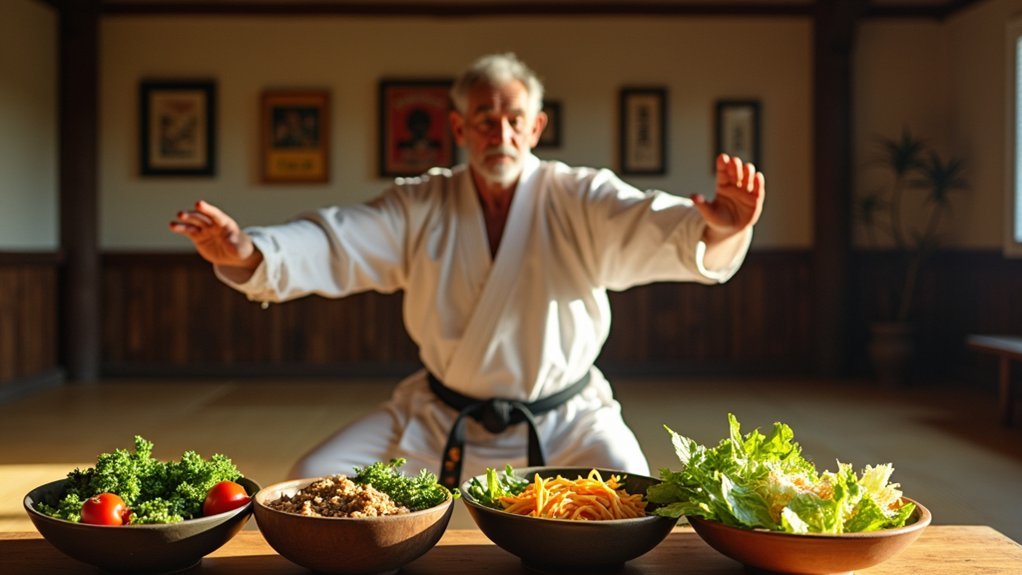
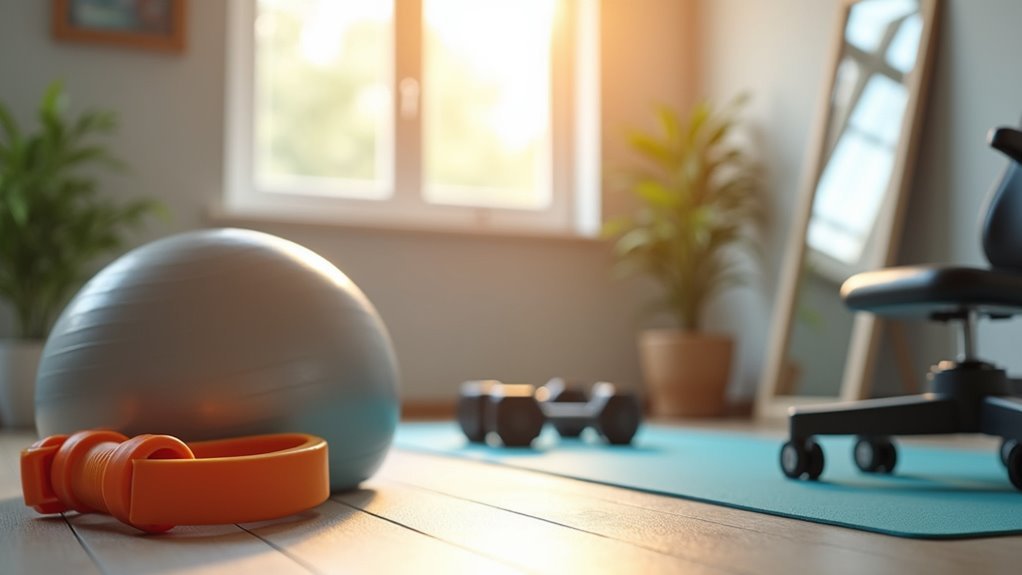
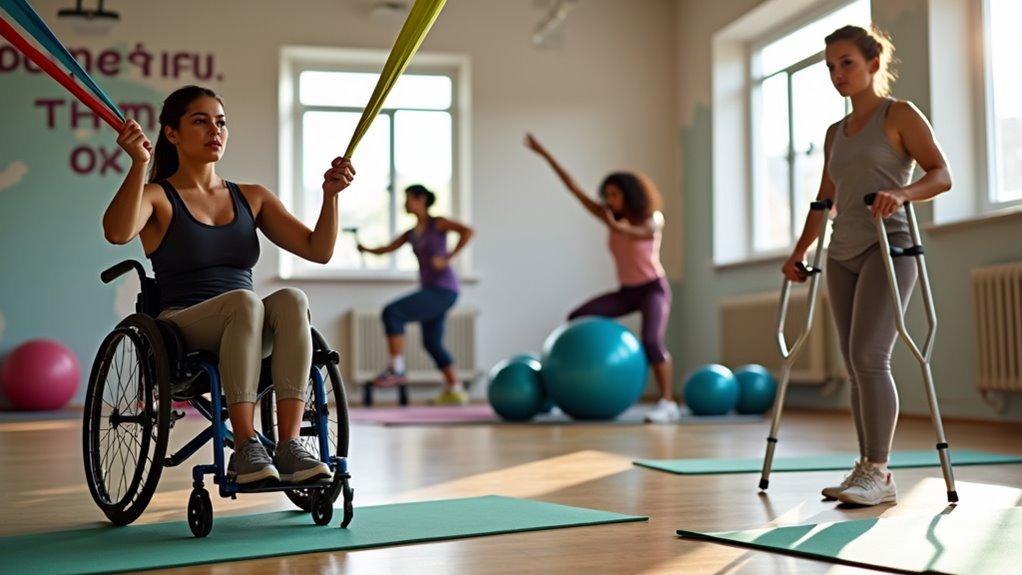
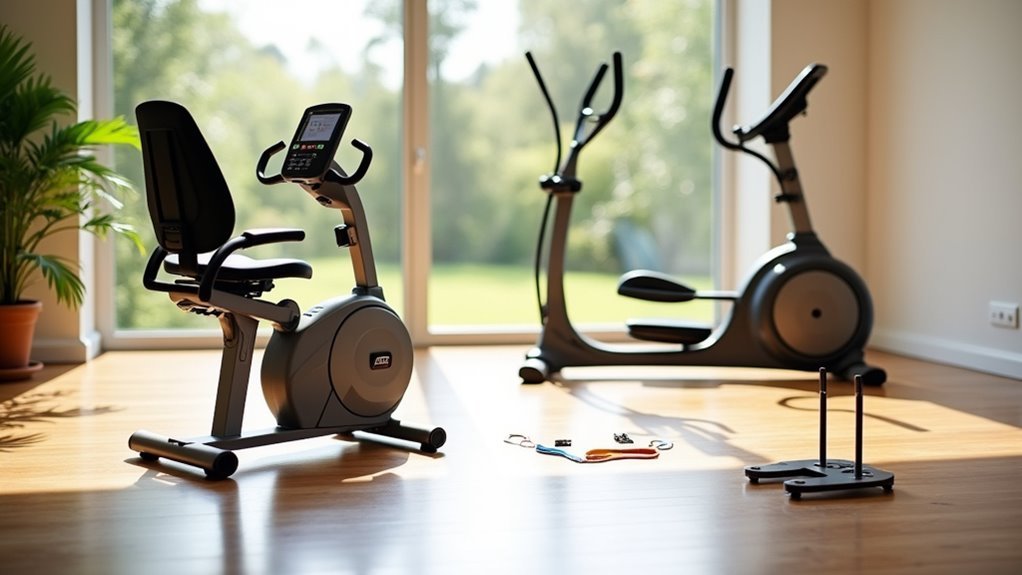
Leave a Reply